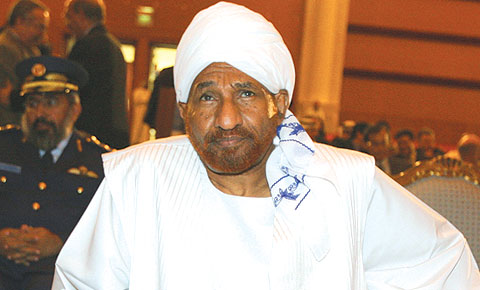
The Defense Team of Imam Sadiq al-Mahdi
PO Box: 10055 Khartoum / Sudan
Phone: 0912307790
ــــــــــــــــــــــــــــــــــــــــــــــــــــــــــــــــــــ
Date: 06/03/2014
Summary of the Topics of the Press Conference held by the Team
Teeba Press Hall, Khartoum
We are holding this press conference to clarify some legal facts relating to the case of our client, who is being detained on behalf of the CrimesAgainst the State Prosecution in Kober prison.
Despite the very simplicity of the facts of this case and the readiness of our client to defend himself, the prosecutionrefusesneither to release our clienton bail, nor to complete the investigation and submit the case file to the competent court. Moreover, the prosecution assumed to itself a jurisdiction authority that does not apply legally to it, in banning publication about the case, whichis detrimental to the cause of our client whose interest is for the public opinion to follow the procedures facing him, due to the fact that his case is by all standards a public opinion one.
Thus, the implication of the prosecutor’s decision is to keep our client in custody without a court ruling, and to let the proceedings of his case go into darkness, which are both contradictory with the principles and/or rules of justice .
First:InvestigationProcedures
- On Wednesday 5/14/2014 the National Intelligence and Security Service (NISS) filed complaint No.2402/2014 against our client, who was summoned Thursday05/15/2014 to the he prosecution, and was interrogated with under four articles of the Criminal Code (CC) of 1991: A/62 (the incitement of general disgruntlement amongst members of the armed forces),A/ 66 (publishing false news),A/ 69 (breach of public peace) and A/159 (defamation). He was then released on bail.
- On Saturday 05/17/2014 the prosecutor added two articles of the same law: A/50 (undermining the constitutional order) and A/63: (calling for violent opposition or usage of criminal force.) Our client was arrested the same evening. After interrogating with him,the prosecution relied on the text of A/50-CC punishable by death or life imprisonment, read with the text of article /106 of the Criminal Procedures Act (CPA) of 1991, which prohibits bail release for those who are arrested with a crime punishable by death; and thus ordered to detain him until the end of the trial.
- On 05/20/2014 we appealed for the prosecution that its decision not to release our client on bail is marred by serious errors, as A/106-CPA read with A/50-CC is not applicable in his case in particular, because:
- Our client is above seventy years in age, and articles 36 /1 and 36/2 of the Constitution prohibit applying or executing a death penalty on those who have reached the age of seventy, unless in murder cases.
- Article 27/2-CC prohibits death sentences on those who are above seventy years old, unless in murder cases.
- Article 33/4-CC prohibits prison sentences on those who are seventy years old except in the cases of banditry.
- Since it is not possible for the court, even ifit convicted our client, to rule later with death or imprisonment penalties on him under A50-CC, then it is a mistake, therefore, to apply the text of A106-CPA, during the investigation phase.
- Because of all of the above, we sought the release of our client on bail or personal pledge.
- In all cases, and as the case’ facts are very simple, despite the many charges in the mentioned articles, and since investigation was completed, we also appealed to enforce A53/E-CPA: to summarize the case as soon as possible and submit it to the competent court, so as not to turn the pre-trial detention of our client into an administrative penalty on him by a non-judicial authority.
- On 05/29/2014, while our client is still under detention pending investigation in Kober prison, and as the facts of the case does not require all this elongation of the investigative procedures, we have again repeated our previous request to summarize the case and pass it immediately to the competent court, so as not to turn the pre-trial confinement into an administrative punishment predicted by the prosecution on our client, on the pretext of investigation.
- Unfortunately, the prosecution continued in its elongation approach even with our mentioned requests, and has not yet decided on them.
Second: The Publication Ban Resolution:
In 05/27/2014 the prosecution issued a resolution banning publication about this case.
Does the prosecution have the right to do so?!
To answer this question we cite the following:
- The principle of the separation of constitutional powers requires considering the prosecution as part of the Office of the Attorney General in the Ministry of Justice, which is an integral part of the executive branch/ the government. It is neither part of the legislative authority issuing laws, nor of the judiciary that have the right to rule regarding publication allowance or ban.
- Discharge of justice requires the highest degree of transparency in the actions taken in all the phases, including the phase of investigation. The golden base respected in all legal systems whether Eastern or Western, is that: “justice to be done is justice to be seen as being done”, and it is known that the media is only adding in this respect, as it expands the potential of seeing justice as it is applied at any phase of the case proceedings.
- The Criminal Procedure Act of 1991, which regulates the Criminal Prosecution and its powers in the second chapter (from A/17 to A/21), do not grant the State Security Prosecution the authority of banning publication in any of its articles.
- Neither do the Order of the establishment of the State Security Prosecution in 1998 grant it the authority to ban publication of the investigation facts in any case before it, nor do all the subsequent amendments of the order, which are only widening its scope to include crimes relating to forgery, counterfeiting of currency and impersonate.
- The bylaw regulating the prosecution agencies of 1998 and its amendments do not grant this prosecution the authority to ban publication.
- Therefore, there is no legal basis that can justify the mentioned resolution issued by the prosecution.
Conclusion:
The insistence of the prosecution to deny our client the right to be released on bail, and its slowness in the inquiry proceedings despite the simplicity of the facts, can only mean the transform of the pre- trial detention into an administrative penalty exercised by a non- judicial body. The prosecution decision of banning publication during the inquiry phase, while it is an executive body not authorized to issue such a decision, does not mean but the attitude of letting the case proceed whilst the dark.

